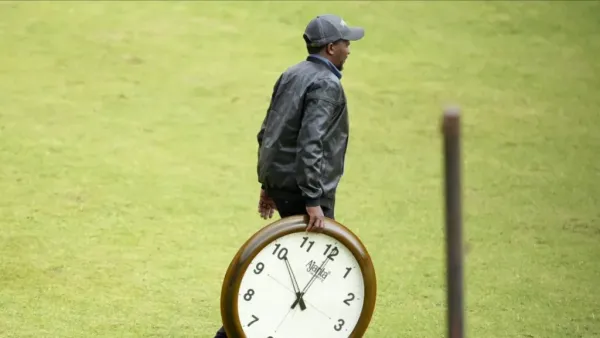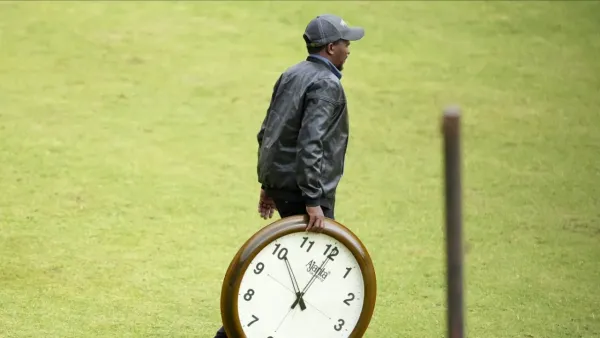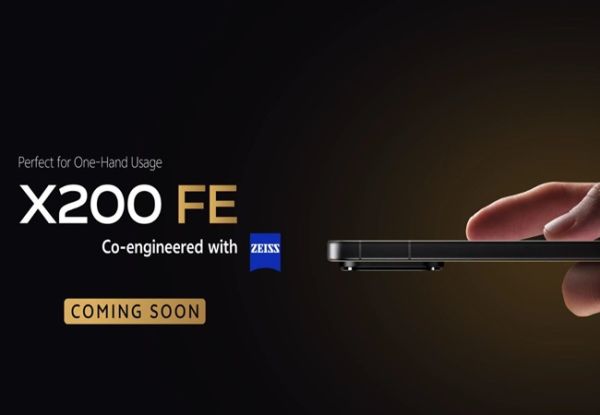

New ICC Test Rules: The ICC has made several major changes to cricket’s playing conditions, including bringing the stop clock rule into Test matches for the first time. This move is aimed at speeding up slow over rates and is part of a wider set of updates covering ball handling, DRS reviews, and fair play rules across all formats.
New ICC Test Rules
Saliva Use Won’t Automatically Force Ball Change
The ICC has changed how umpires handle saliva on the ball. While saliva is still banned, the ball will no longer be changed automatically if it’s used. Umpires will now check if the ball’s condition has clearly been altered—like being too wet or unusually shiny—before replacing it. If they decide the ball is fine, it will stay in play. Teams trying to trigger a ball change on purpose by using saliva will be penalized five runs, but won’t get a new ball unless it’s necessary.
Stop Clock Comes In for Red Ball Cricket
The stop clock, already in use in limited-overs cricket, now applies to Tests from the start of the 2025–27 World Test Championship cycle. Fielding sides must begin a new over within 60 seconds of the previous one ending, or risk escalating penalties. After two warnings, umpires will award five penalty runs to the batting team. The clock, which counts upward from zero to sixty and resets every 80 overs, is designed to tighten the flow of play in a format long burdened by sluggish tempo.
DRS Rewritten: ‘Out Means Out’
Under revised DRS protocols, the ICC has resolved a long-standing quirk in cases involving multiple modes of dismissal. If a batter is given out caught behind but UltraEdge shows no bat contact, ball-tracking for a secondary lbw review will now retain the original ‘out’ decision. That means even if the impact is “umpire’s call,” the batter will remain out, a significant departure from the previous system, where “not out” was the default fallback.
In cases where both the umpires and players ask for reviews on the same delivery, the decisions will now be reviewed in the order they happened. For example, if there’s an appeal for lbw followed by a run-out, the lbw will be checked first. If the batter is found out on that, the ball will be considered dead, and the run-out review won’t be needed.
New ICC Test Rules: Catch Fairness Will Still Be Reviewed on No-Balls
In another adjustment, the fairness of a catch will still be reviewed, even if a no-ball has already been called. Previously, a no-ball nullified the need for review. Under the new conditions, a fair catch following a no-ball will result in just one run for the no-ball, while an unfair catch would allow the batting side to retain any runs completed.
Deliberate Short Runs Will Be Reviewed
According to the new ICC Test rules, deliberate short runs will now face stricter punishment. If a batter is judged to have purposely missed making their ground to gain an extra run, the umpires will let the fielding team choose who faces the next ball. The batting team will also be penalised five runs.
Domestic First-Class Cricket to Trial Full-Time Injury Replacements
In a potentially game-changing trial, member boards have been invited to pilot full-time injury substitutes in domestic first-class competitions. These replacements, akin to concussion substitutes, must be like-for-like and can only be approved in cases of evident external injury. Soft tissue complaints such as hamstring strains will not qualify.
While some of these rules, particularly the stop clock in Tests, are already active, others, including ball protocols and DRS updates, come into effect across formats from 2 July 2025.
These changes underscore the ICC’s intent to tighten the game’s pace, close tactical grey areas, and bring greater procedural clarity to officiating, perhaps a sign that cricket’s laws, like its players, must continue to adapt to a modern, demanding calendar.
Get the Latest Cricket Updates at IceCric.News. Also, Follow Our Social Media for live updates on Facebook and Instagram.
-
How to submit your Arji to Khatu Shyam Ji without visiting the temple

-
From glowing skin to weight loss, juice of this thing with carrots is no less than a miracle

-
Consuming these 6 fruits will eliminate stains, will improve the skin

-
Group Captain Shubhanshu Shukla created history, the first Indian to reach ISS

-
Vivo X200 Fe Launching Official Confirm in India; Microsite is also live

